|
|
|
Sort Order |
|
|
|
Items / Page
|
|
|
|
|
|
|
| Srl | Item |
| 1 |
ID:
154923
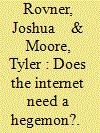

|
|
|
|
|
| Summary/Abstract |
Hegemonic stability theory holds that a dominant power can produce international cooperation by providing public goods and resolving collective action dilemmas. Successful hegemons also resist the temptation to exploit their advantages in order to reduce other states’ fear of domination. This article asks whether or not the internet needs the United States to play a similar role. If so, Washington should pursue policies designed to strengthen internet security while eschewing espionage and cyberattacks that rely on some degree of internet insecurity. If not, it can go on the offensive without fear of undermining the system as a whole. We examine the technical and political fallout from revealed offensive cyberoperations to assess the relative fragility of the internet. Our findings suggest that it is relatively resilient.
|
|
|
|
|
|
|
|
|
|
|
|
|
|
|
|
| 2 |
ID:
112277
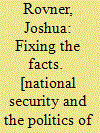

|
|
|
|
|
| Publication |
Ithaca, Cornell University Press, 2011.
|
| Description |
ix, 263p.
|
| Standard Number |
9780801448294
|
|
|
|
|
|
|
|
|
|
|
|
Copies: C:1/I:0,R:0,Q:0
Circulation
| Accession# | Call# | Current Location | Status | Policy | Location |
| 056411 | 327.1273/ROV 056411 | Main | On Shelf | General | |
|
|
|
|
| 3 |
ID:
134007
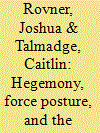

|
|
|
|
|
| Publication |
2014.
|
| Summary/Abstract |
International relations theories emphasize the stabilizing role hegemons play in world politics. But little scholarship has examined the link connecting hegemony to its potentially positive returns in the security realm: force posture. We correct this deficit by developing and testing an argument about the consequences of different hegemonic force postures under varying threat conditions. We present a typology of force posture options and probe their effects through over-time analysis of how major powers have worked to provide one particularly important public good since 1945: access to Persian Gulf oil. Drawing on field work, we also explore the implications of our framework for current and future US force posture in the region. We conclude that hegemonic stability is a very real phenomenon in the Gulf, but it does not require the massive forward deployment of US forces that has characterized the past twenty years of US presence there.
|
|
|
|
|
|
|
|
|
|
|
|
|
|
|
|
| 4 |
ID:
111789
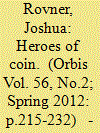

|
|
|
| 5 |
ID:
119428


|
|
|
|
|
| Publication |
2013.
|
| Summary/Abstract |
Intelligence may have a bright future. Advances in imagery and signals processing technology mean that intelligence agencies can deliver remarkably accurate and timely intelligence to civilian officials and military commanders. However much leaders gripe about intelligence, few are likely to disregard such fine-grained information about threats and opportunities, especially when national security is on the line. Others contend that intelligence is central to the kind of wars that the United States is likely to fight in the foreseeable future. Counterterrorism, for example, depends on intelligence agencies to provide detailed descriptions of terrorist organizations, warning of impending attacks, and precise targeting information for offensive actions. U.S. counterterrorism operations will persist long after the country draws down from Afghanistan, because of the geographic expansion of groups associated with al-Qaeda, and because of the growing enthusiasm for special operations forces (SOF) and unmanned aerial vehicle (UAV) strikes against them. 1 Most importantly, policymakers have invested lavishly in intelligence for over a decade. President George W. Bush called for a large increase in the intelligence personnel in the wake of the 11 September 2001 (9/11) attacks on New York City and Washington, DC. Later, Congress created the Office of the Director of National Intelligence (ODNI), adding a new layer of bureaucracy above an already sprawling constellation of agencies. And, despite a great deal of criticism, the budget for intelligence has more than doubled since 9/11 and continues to rise.
|
|
|
|
|
|
|
|
|
|
|
|
|
|
|
|
| 6 |
ID:
118368
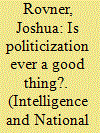

|
|
|
|
|
| Publication |
2013.
|
| Summary/Abstract |
Politicization is the manipulation of intelligence estimates to reflect policy preferences. Policymakers are guilty of politicization if they compel intelligence agencies to alter their conclusions in ways that are politically convenient or psychologically comforting. Intelligence officials are guilty of politicization if they shape their estimates to reflect their own beliefs and preferences. At first glance politicization appears to be an unalloyed hazard: manipulating estimates seems to make bad intelligence inevitable. Nonetheless, some observers argue that under certain circumstances politicization can be a good thing, or at least a necessary risk. Intelligence officials should be willing to take that risk if the alternative means isolating themselves from the policy process and sacrificing any possible influence over policymakers' judgment. They also should be willing to tone down their conclusions on major issues, or withhold estimates on minor ones, in order to avoid offending policymakers. This kind of 'soft politicization' does not mean outright pandering, but it does constrain intelligence leaders from being blunt about estimates that are frankly at odds with policy beliefs and preferences. This article evaluates the possible benefits of politicization and tests it against the historical record. I conclude that politicization - even soft politicization - undermines the quality of threat assessment and does lasting damage to intelligence-policy relations.
|
|
|
|
|
|
|
|
|
|
|
|
|
|
|
|
| 7 |
ID:
142990


|
|
|
|
|
| Summary/Abstract |
Five years ago, the total number of U.S. military personnel in the Persian Gulf was over 230,000. Today, that number is well under 50,000. The rapid exit of so many U.S. fighting men and women has caused many observers to fear for the future of the Gulf. As one analyst put it, the regional forecast is bleak with “violence, followed by intermittent violence, and renewed violence.”
|
|
|
|
|
|
|
|
|
|
|
|
|
|
|
|
| 8 |
ID:
158524


|
|
|
|
|
| Summary/Abstract |
Increasing diplomatic tension between China and the United States has led to concerns about military conflict, possibly including rapid nuclear escalation. Scholars have spent less time considering the opposite scenario: protracted conventional war. This analysis explains why a combination of politics, geography, and technology may conspire to produce such a war, despite the fact that both sides are planning for a short, high-intensity fight. It shows how the Peloponnesian War, an ancient conflict fought with ancient weapons, nonetheless provides a warning of what might happen in the present. It also describes a grim trade off that American policy-makers will face in the event of war. Washington can take steps to reduce the chance of nuclear escalation, but in so doing will make a long war more likely. The conclusion describes the diplomatic challenge of war termination in a protracted conflict where neither side can compel the other to back down.
|
|
|
|
|
|
|
|
|
|
|
|
|
|
|
|
| 9 |
ID:
153325
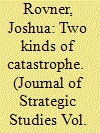

|
|
|
|
|
| Summary/Abstract |
China’s expanding strength and ambition may foreshadow a violent conflict with the United States. I describe two scenarios about how such a conflict would unfold. The article begins by examining the prospects for nuclear escalation, drawing on theories about politics, psychology, and inadvertent escalation. It then examines the prospects for protracted conventional war, a scenario that has received far less attention. I present a new theory of protraction based on technology, geography, and domestic politics. After assessing the logic of both scenarios against a hypothetical US–China conflict, I discuss which is more likely. The conclusion points to a sobering trade-off: efforts to avoid nuclear catastrophe increase the chance of a long and grueling fight.
|
|
|
|
|
|
|
|
|
|
|
|
|
|
|
|
|
|
|
|
|